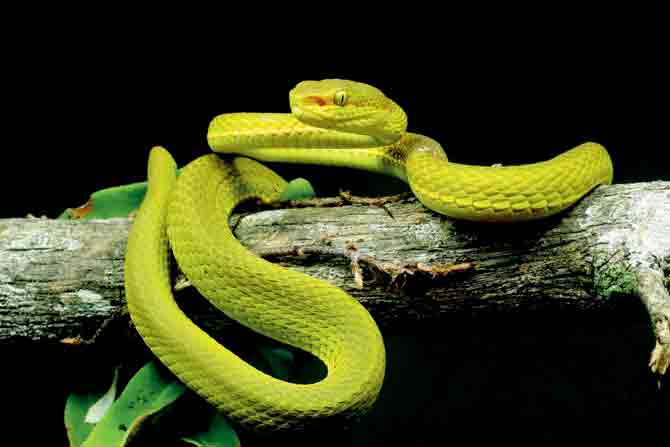Potterheads dedicate pit viper species in Arunachal to fantasy wizard; hope new discovery will focus attention on its habitat-s destruction for infrastructure

(From left) Zeeshan Mirza, local assistant Buban Gogai, Pushkar Phansalkar (Wildlife Institute of India, Dehradun), Mandar Sawant (BNHS), a forest department guard, and Harshal Bhosale in the jungles of Arunachal Pradesh; not in frame: Gaurang Gowande (Fe
Zeeshan Mirza is waiting for a reply from JK Rowling, the British author behind the iconic Harry Potter series. Their communication concerns a pit viper, and it-s fitting that the Bengaluru-based researcher from the National Centre for Biological Sciences is a self-confessed Potterhead. He was the introvert kid who found a sanctuary in Potter-s world, which makes "the tribute to Salazar Slytherin" special.
ADVERTISEMENT
Deep in the evergreen forests of Pakke Tiger Reserve, Arunachal Pradesh, a new venomous species of the pit viper was discovered by Mirza, friend and co-team leader Harshal Bhosale, along with Pushkar Phansalkar, Mandar Sawant, Gaurang Gowande and Harshil Patel. A paper to document this discovery was published last week in the international science journal, Zoosystematics and Evolution.
"Commonly referred to as Salazar-s pit viper [Trimeresurus Salazar], two species of this specimen were found on field during our expedition in these forests last year from June to August," recalls Mirza. Bhosale, from the Bombay Natural History Society, had first photographed this species and showed it to Mirza; the duo-s association goes back a decade. "In 2011-12, I had spotted this species on a visit, but wasn-t sure since its characteristics didn-t match with other pit vipers, morphologically. So, we decided on the expedition. Permissions were sought from the Arunachal Pradesh forest department in 2017, and by 2019, we were on our way," recalls Bhosale, adding that the team came together organically and was backed and funded by Shripad Halbe of the Mumbai-based Brihad Bharatiya Samaj and the Singinawa Conservation Foundation.

The length of the species is 36-41 cm. Found in lower elevations, it is unique in bearing a rusty red or orange line along the face running throughout the body in males
"Arunachal has a rich, complex ecosystem. It is home to the eastern Himalayas, the Brahmaputra, and the Arakkan range, with elevations that begin at 150m and rise to 7,000m," shares Bhosale, as he breaks into a chuckle, while recalling that locals called the team foolish to arrive in the monsoon, which has an extended run here. "This species bears similarity with the White lipped pit viper [Trimeresurus albolabris] which is widely spotted in the forests of South Asia, so people, including early British naturalists who came here in the 1880s, assumed it was that. In those days, not all data was documented; colonists would rarely collect the specimens personally, and so it-s possible that by the time the species and information reached them, it would have been in preserved form," reasons Mirza about its falling off the radar.

Artist-s impression of the House of Slytherin crest, from the Harry Potter series by JK Rowling
On their fifth night in Pakke, they started early, at 6.30 pm, and spotted their first snake by 8 pm. However, when they approached it, it dropped off Bhosale-s snake hook stick and disappeared in the undergrowth, much to the team-s dismay. By the sixth night, they spotted two species coiled on shrubs along the road. "I began DNA testing of the collected samples. On our return, I travelled to the Natural History Museums in London, Paris and Copenhagen, to compare DNA sequences of closely related species, where it emerged that this was indeed a new species," shares Mirza. It turns out, not just Mirza but the entire team, barring Bhosale, are Potterheads. So, when it came to naming the species after the pure-blood cunning wizard Salazar Slytherin, the decision was unanimous.

Harshil Patel and Gaurang Gowande
What is a matter of concern for the team, however, is the proposed 49-km Seijosa-Balukpong Road that will cut through this forestland. "Since it will reduce distances only by 10 km, is it really worth it?" asks Mirza, adding that while they believe infrastructure and development is important in the state, it needs to be done in an informed manner. "It-s a well-known fact that a lot of snakes die in road accidents, and this particular species moves slowly." The construction of about 60 dams are also in the pipeline, which, if built, will cause irreparable loss to flora and fauna in the state. Bittu Sahgal, founder-editor of Sanctuary Asia, while congratulating the team for discovering this exquisite reptile, is upset about the infrastructure development at the cost of the environment. "There are so many hidden jewels in the wildernesses that we are so casually sacrificing for short-term profit. The Pakke Tiger Reserve wilderness is under attack from contractors and their cohorts who, figuratively, think nothing of burning down an ancient library without knowing of the treasures lie within."
The researcher duo is hopeful that this discovery will create awareness. "As scientists, it-s our job to share this information with conservationists and activists, and also with those responsible for infrastructure plans," believes Mirza.
The government needs inventive thinkers

The discovery of new species of snakes in India has reached a new high these past few years with at least 35 new species having been described since Ashok Captain and I came out with the book, Snakes of India—the Field Guide in 2004. We are hoping to come out with an updated edition with photographs of all the Indian snakes. It took us 10 years to complete the first, so don-t hold your breath. The new green pit viper found and described by Zeeshan Mirza and colleagues is an exciting addition to the herpetofauna of wonderful Arunachal Pradesh.
Regarding the 49-km Seijosa-Balukpong Road, it should be evident to us that all Roads cutting through our limited Protected Areas should not happen. When you see the state of some of the roads in the North East of India, which collapse every monsoon, you wonder why some original thinking is not being done. In other mountainous parts of the world where there are similar problems, the solutions include cable cars. The Government of India urgently needs to collaborate with some inventive thinkers and doers instead of continuing with mindless construction and repair of mountain roads. Or they should Google what-s going on elsewhere.
Padma Shri Romulus Whitaker, an NYC-born Indian herpetologist, wildlife conservationist and founder of the Madras Snake Park and the Andaman and Nicobar Environment Trust
Catch up on all the latest Mumbai news, crime news, current affairs, and a complete guide from food to things to do and events across Mumbai. Also download the new mid-day Android and iOS apps to get latest updates.
Mid-Day is now on Telegram. Click here to join our channel @middayinfomedialtd and stay updated with the latest news
 Subscribe today by clicking the link and stay updated with the latest news!" Click here!
Subscribe today by clicking the link and stay updated with the latest news!" Click here!






